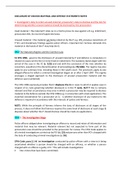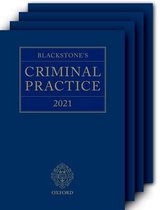DISCLOSURE OF UNUSED MATERIAL AND DEFENCE STATEMENTS NOTES
a. Investigator’s duty to retain unused material, prosecutor’s duty to disclose and the test for
determining whether unused material should be disclosed by the prosecution
Used material = the material P relies on in a trial to prove its case against a D e.g. indictment,
prosecution WS, Ds record of taped interview.
Unused material = the material not being relied on by the P e.g. WS, previous convictions of
P W’s and disciplinary findings against police officers. Important b/c fairness demands this
material in the hands of the P may help the D.
D9.2 The Statutory Regime and the Common Law
S1 CPA 1996 - governs the disclosure of unused material by P and defence is compulsory in
relation to cases sent to the CC to be tried on indictment. The statutory duties begin with the
arrival of the case in the CC (s. 1(2)) and end with the conclusion of the trial, whether by
conviction, acquittal or the discontinuation of proceedings (s. 7A(1)(b)). The regime may also
apply to any summary trial, including those in the youth court. The provisions apply to any
alleged offence for which a criminal investigation began on or after 1 April 1997. The regime
envisages a staged approach to the disclosure of unused prosecution material and the
defence case (numbered)
The CPIA 1996 expressly provides that it displaces the CL in cases to which it applies save in
respect of CL rules governing whether disclosure is in the PI (s21). BUT→ the CL remains
relevant and that circumstances may arise in which a prosecutor may be required to disclose
material to the defence outside the CPIA 1996 (e.g. in connection with a bail application). The
essential consideration for a prosecutor at CL is whether disclosure of any material to the
defence is required in accordance with the interests of justice and fairness.
NOTE: While the principle of fairness informs the duty of disclosure at all stages of the
process, it does not follow that fairness requires the same level of disclosure at each stage &
disputes about whether the P should disclose should be made via applications.
D9.6 1. The Investigation Stage
Police officers obliged when investigating an offence to record and retain all information and
material that may be relevant. Material relevant but not expected to form part of the
prosecution case should be provided to the prosecutor for review. The CPIA Code applies to
all criminal investigations carried out by PO’s (s. 22) and persons other than PO’s charged with
the duty of conducting criminal investigations (s. 26).
CPIA Code, para.2.1→ ‘an investigation conducted by police officers with a view to it being
ascertained whether a person should be charged with an offence, or whether a person
charged with an offence is guilty of it.’ This will include investigations:
• Into crimes that have been committed;
,• Whose purpose is to ascertain whether a crime has been committed, with a view to the
possible institution of criminal proceedings; and
• Which begin in the belief that a crime may be committed, e.g. when the police keep
premises or individuals under observation for a period of time, with a view to the
possible institution of criminal proceedings.
D9.8 Responsibilities of Investigators and Disclosure Officers
The CPIA Code emphasises the need to retain clear records of the identities of the persons
performing these roles; that they are carried out by suitably experienced individuals,
independent of the investigation; and that the investigative process is tailored to the
circumstances of each case (paras.3.3 to 3.7). The code puts a police officer (the disclosure
officer) at the centre of the disclosure process, as opposed to a qualified lawyer
(controversial). The CPIA Code provides for delegation under arrangements for joint
investigations (para.3.4)
D9.10 Duty to Record and Retain Material
The investigators must record, in a durable/retrievable form, all material which may be
relevant to the investigation and which is not already recorded. This record incl. negative
information, e.g. the fact a no. of people at a place/time saw nothing unusual (para.4.1). Also
responsible for retaining all material obtained in a criminal investigation that may be relevant
to the investigation (para.5.1). Material will be ‘relevant to an investigation’ if it appears to
an investigator or disclosure officer that it has merely some bearing on any offence under
investigation or any person being investigated, or on the surrounding circumstances of the
case (para 2.1). 'Material' includes that gathered in the course of the investigation (e.g.
documents seized during searching premises) and generated by the investigation (e.g.
interview records) (para.2.1).
The CPIA Code identifies that the duty to retain material will include, e.g. the following
categories of material: crime reports, including crime report forms, relevant parts of incident
report books and police officers' notebooks; final versions of WS; draft versions of WS where
their content differs from the final version; interview records (written or taped); expert
reports and schedules; any material casting doubt upon the reliability of a confession; and
any material casting doubt on the reliability of a witness (para.5.4) AND makes clear the duty
to retain material does not extend to items purely ancillary to the above categories which
possess no independent significance, such as duplicates of documents (para.5.6).
D9.12 Duty to Reveal Material to the Prosecutor
Material relevant but disclosure officer believes not form part of P case, must be listed on a
schedule (para 6). The obligation to prepare a schedule arises in all cases likely to be heard in
the CC and all cases in the MC where the accused is likely to plead not guilty.
In CC cases→ the disclosure officer must prepare a schedule on a form, known as the MG6C,
which lists such retained material. In MC→ in cases where the accused is likely to plead not
guilty, a streamlined disclosure certificate is prepared. It is these schedules which the
, prosecutor will review when making decisions as to whether material is to be disclosed to the
defence, applying the relevant statutory test.
Any 'sensitive material' (the investigator believes would give rise to a real risk of serious
prejudice to an important PI if it were disclosed (para.2.1)) should be listed in a separate
schedule or, exceptionally, disclosed to the prosecutor separately. Sensitive schedules must
contain sufficient information to enable the prosecutor to decide whether the material
should be viewed, bearing in mind its confidential nature (para.24). Examples of sensitive
material incl. relating to national security, given in confidence, relating to informants,
undercover police officers, and relating to child witnesses (para 6.15).
The A-G's Guidelines emphasise that descriptions by disclosure officers in non-sensitive
schedules should be clear and accurate and must contain sufficient detail to enable the
prosecutor to make an informed decision on disclosure (para.23).
An investigator should draw the prosecutor's attention to any material which might satisfy
the test for prosecution disclosure and must give the prosecutor a copy of any material falling
within certain categories in para.7.3, incl. info provided by an accused indicating an
explanation for the offence and relating to the reliability of a confession or a P witness.
NOTE: the P duty to disclose is not rendered redundant if officers withhold information from
counsel, or if officers withhold information from one another.
At the conclusion, a disclosure officer must certify to the prosecutor that to the best of his
knowledge and belief the duties imposed under the code have been complied with (para.9).
2. The Prosecution duty of disclosure
D9.13 Responsibilities of Prosecutor to Review Material
It is the prosecutor's task to review the schedule(s) provided by the disclosure officer and to
assess the need to make disclosure of the underlying material to the defence by applying s3
CPIA 1996. BUT: duty for disclosure should be kept under review throughout proceedings.
The A-G's Guidelines require prosecutors to do all that they can to facilitate proper disclosure
incl. probing actions taken by disclosure officers, reviewing schedules and taking action to
correct or improve them (paras.28 to 30).
Prosecutors must consider any defence statement thoroughly, even if it points to other lines
of inquiry. They should advise the investigator if any such lines of inquiry should be pursued
and challenge inadequate, defence statements in writing (paras.31 to 33).
Prosecution must ensure that all material which ought to be disclosed is disclosed to the
defence, satisfy themselves that they are in possession of all relevant material and that they
have been fully instructed as regards disclosure matters, and keep all disclosure decisions
under review (paras.35 to 37).
R [2016] → five broad propositions for disclosure regime generally:
(a) The P are in the driving seat at the stage of primary disclosure.





